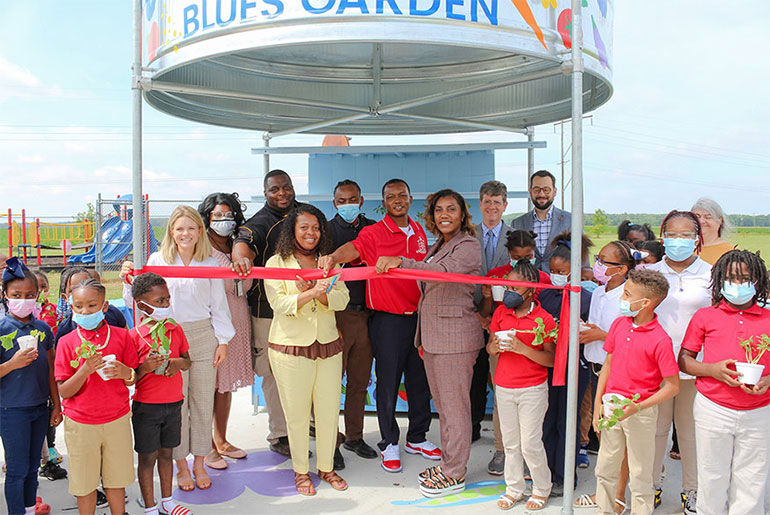New MSU learning garden celebrates local flora, culture in Leflore County
Author: Vanessa Beeson

Leflore County Elementary School Principal April Smith cuts the ribbon as students and other leaders from the local area and Mississippi State University look on during a May 19 ribbon cutting ceremony for the new blues-themed learning garden. (Photo by Kenner Patton)
Learning is flourishing in the Mississippi Delta as Mississippi State faculty and Leflore County leaders celebrate the installation of a blues-themed learning garden at Leflore County Elementary School with a ribbon cutting this week.
MSU faculty and students built and installed the state's third MSU learning garden using an award-winning concept called The Living Room: A Freeware Learning Garden Focused on Health, Food and Nutrition Education. The model was developed by those in the MSU College of Agriculture and Life Sciences landscape architecture department and the College of Architecture, Art and Design architecture and graphic design programs.
Abbey Wallace, assistant professor of landscape architecture, co-led the project with Suzanne Powney, associate professor of graphic design. Wallace said the design/build collaboration between CALS and CAAD includes five landscape architecture students, who designed and built the garden's infrastructure and eight graphic design students, who themed the garden, developing its graphics and color scheme.
"This garden integrates a pod system that's customized to the school. Leflore County Elementary is pre-K through sixth grade so we created three pods for different ages," Wallace explained.
The blues-themed garden includes a counting-themed pod for Pre-K through first graders with shorter benches and planters for smaller children, a pod themed around locally grown vegetables for second through fourth graders, and a pod all about pollinators for fifth and sixth graders. Each pod has a planter area, seating area and trellis where plants will grow to provide shade. An irrigation system is included.
The team also built a 40-student amphitheater as an outdoor classroom at the school's request. A shaded teacher's station with counterspace, storage and chalkboard complete the learning environment.
Wallace said the nature of the project gives MSU students a chance to develop and implement real-world design.
"A unique aspect of this is that students must think how these design elements can be constructed so they can be transported. We put everything on a 24-foot-long trailer so we must figure out how to design it so we can transport it and put it together in four days," she said.
She said the goal was to design a comfortable low-maintenance space the school's teachers, staff and students would consider their own.
"While building the garden, I heard an elementary school student say he couldn't wait to grow turnip greens in the garden. While we design these spaces thinking that children aren't familiar with gardening, seeing him excited shows the garden is also a chance for students to develop ownership and learn about concepts like time and responsibility," she said. "This garden is more than just teaching our students about design. It demonstrates how our university can impact local communities in Mississippi."
Cory Gallo, interim assistant dean and landscape architecture professor, led the design/build of two previous learning gardens. He echoed Wallace's sentiment of the gardens' effect on local communities.
"I'm thrilled that this is the second garden in the Mississippi Delta. It's an opportunity for our students to get that experiential learning, but also a great cause that hopefully will have a real impact on kids in the area," he said.
He's most proud of passing along the reins to Wallace, an MSU landscape architecture alumna who returned to her alma mater to make a difference in her home state.
"I'm so proud of Abbey coming in and knocking it out of the park. The project moves the idea forward in new ways and is a very complete solution based on the idea of a working garden delivered on a truck and installed in a few short days," he said.
Collaborators include AIM for CHangE (Advancing, Inspiring, Motivating for Community Health through Extension), an MSU Extension program, which funded the project with support from the Centers for Disease Control and Prevention.
For more on MSU's Department of Landscape Architecture, visit www.lalc.msstate.edu. Visit the Department of Art's graphic design program at www.caad.msstate.edu/category/graphic-design.
Date: 2022-05-20




